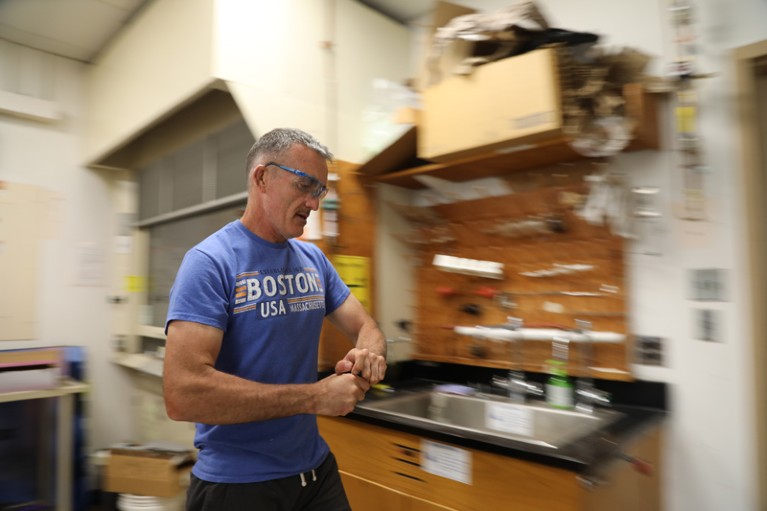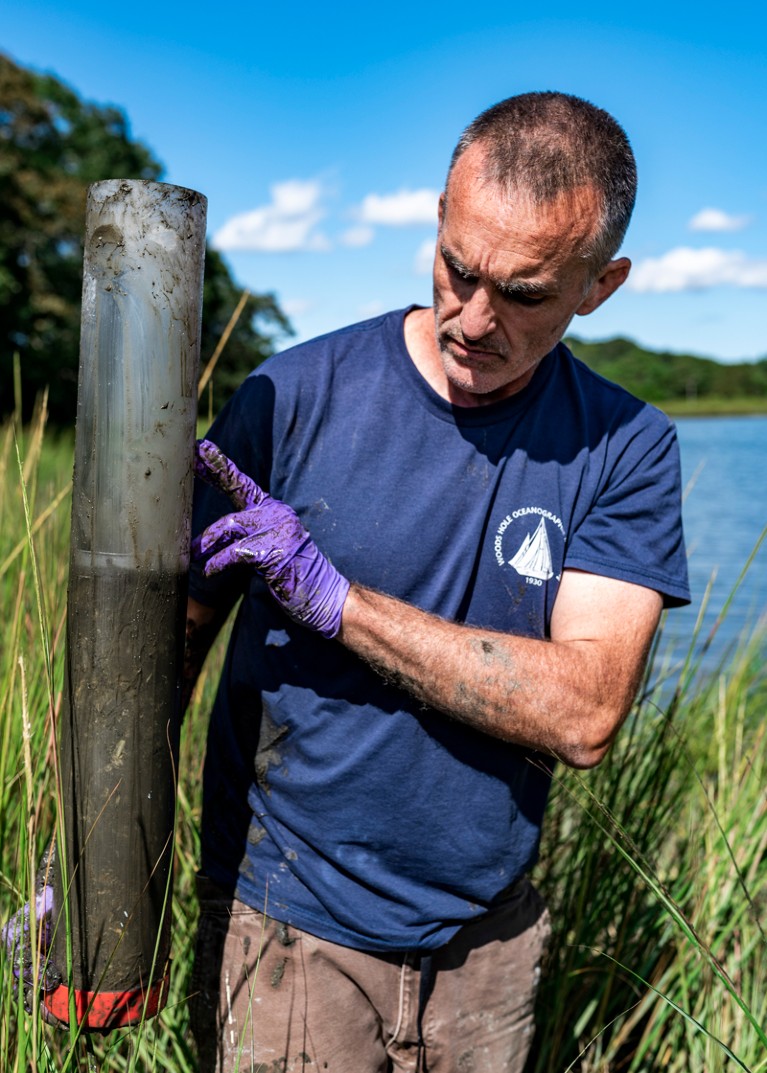
Marine chemist Christopher Reddy analyses oil-spill samples at his laboratory at the Woods Hole Oceanographic Institution in Massachusetts.Credit: Matthew Barton
On 15 June 2010, marine chemist Christopher Reddy pushed himself past the point of exhaustion. In the morning, he testified before the US Congress in Washington DC about government agencies’ readiness to cope with crises such as the unfolding Deepwater Horizon oil spill. In the afternoon, he flew to Tampa, Florida, to hop aboard a research vessel from which his team would measure how much oil was pouring into the Gulf of Mexico every day in the largest ocean spill ever recorded.
That research was published in Science1 later that year and used by the US government as evidence in the court case to determine how much money oil firm BP owed in restitution for the spill. It was a career high point for Reddy, but also part of a personal low point. In late 2011, BP subpoenaed Reddy, a senior scientist at the Woods Hole Oceanographic Institution in Massachusetts, and his colleagues for their e-mails and other communications about the research. The team pushed back as a matter of principle — Reddy considered the request for scientists’ correspondence, not just their data, to be an overreach. But in May 2012, they had to turn over their materials. The stress from the legal proceedings, doing research during a crisis and prioritizing work above his health and personal life added up. During the next six months, Reddy had a nervous breakdown, lost 34 kilograms and was involved in three car accidents. His marriage nearly fell apart.
Reddy details it all in his book, Science Communication in a Crisis: An Insider’s Guide, published in May. The book is part self-deprecating memoir and part nuts-and-bolts guide to interacting with the press and the public. Reddy tells Nature how working on the Deepwater Horizon crisis changed him, and provides tips for scientists who want to engage with the public.
How did you get involved with the Deepwater Horizon response and what was your role?
Before Deepwater Horizon, I had worked on a few oil spills, and I’d befriended folks in government and industry. The first couple of days after the spill, I got a call to see if I wanted to help.
Eventually, I ended up going down to the gulf, and I was everywhere. One moment I was on small boats collecting samples on beaches and salt marshes, and the next, I was on a research cruise and looking at real-time data as a robot swam through the subsurface oil plumes. I was also on a team trying to work out how much oil was being released from the bottom of the sea floor. There were some really crazy days.
Your book gives the sense that this took a big emotional toll on you, especially when you were fighting the BP subpoena.
I think it’s easy for me to say, the straw that broke the camel’s back was trying to fight back against BP. But it was an overwhelming intersection of a lot of things that ended up crashing. I had my identity and my self-worth tied too closely to my career.
I wish somebody had taken me aside, sat me down, and said, “This is not a sustainable pace. And eventually, you’re gonna have to pay the piper.” I might not have listened because this was it, it was the chase, it was a Big Thing. I really worry about the scientists and physicians and engineers who are now coming out of researching and responding to COVID-19; they spent three years thinking about this and working non-stop. Eventually, the rest of your life comes back online.
In many respects, I was OK for the first couple of years. By 2012, there was still a lot of research to be done. But coming down from that was when I was most susceptible and ready to fall, which I did. My science took over my entire life and not in a good way — my health and my personal relationships suffered.

Christopher Reddy says that making ‘oil-spill scientist’ his entire identity led to an unhealthy imbalance.Credit: Daniel Hentz
I remind people all the time that science can wait. This is one of my biggest mantras. I write about how you should not make science your identity. I think that I made ‘oil-spill scientist’ my identity. And, you know, all that led to me being crushed.
This is a personal question, but did you go to therapy at the time?
Yeah, and this is perfectly fine to talk about. I don’t recall being particularly vigilant about therapy from 2010 to 2012. I should have been. But I certainly let that slide.
It’s also important to make sure you have close friends and family who can give you frank advice.
In your book, you caution scientists against speculating about ongoing environmental disasters. Why is this so important?
Often, when these crises happen, there’ll be a ‘talking head’ type of specialist, who makes statements to the press that are misinformed or over the top. They think that they are doing a service. What they don’t understand is that words matter.
I was working on this oil spill in Mauritius in the summer of 2020, and I read that there was an American scientist who was painting a picture in his interview that there was so much oil on the beaches that it was gonna look like the highway, like asphalt.
The people who are affected the most are those who make a living at those beaches, who got married on those beaches, whose kids play there. When they read in the newspaper that an expert says that this beach is going to be the equivalent of an interstate highway, it affects their mental health. There are studies that show that the people who are affected most after a crisis also experience increased amounts of spousal abuse and violence2.
The more I study oil spills, the more it seems to me that we often worry more about dolphins and birds than we do about humans.
So how should scientists who want to get it right talk to the media?
I remind scientists that you have to quench people’s thirst, and you can’t make them wait five years for your paper to come out. And so when you’re asked a question, rather than giving 30 seconds of qualifiers, lead with, “Hey, this is what we know. This is what’s likely to happen, and this is what is unlikely to happen.” Give clear answers and try your best. It’s OK to say you don’t know. But certainly don’t lead with all the things you don’t know.
What are some low-stakes ways for scientists to communicate science to the public or influence public policy?
I think starting local is more attainable. If you’re interested in climate change, drought or erosion, you will have a much better chance of getting an appointment and maybe even doing some relationship-building with your town representative who is on the forefront. Local is just so great, because you have a better chance of talking to the person who matters the most. And that someone doesn’t need a PhD to be talented and valuable — there are a lot of smart people out there. Gravitate towards them.

 How virtual reality is helping to boost scientific engagement in rural Africa
How virtual reality is helping to boost scientific engagement in rural Africa
 How a lupus diagnosis taught me that resilience in science is a double-edged sword
How a lupus diagnosis taught me that resilience in science is a double-edged sword
 What whale falls can teach us about biodiversity and climate change
What whale falls can teach us about biodiversity and climate change







